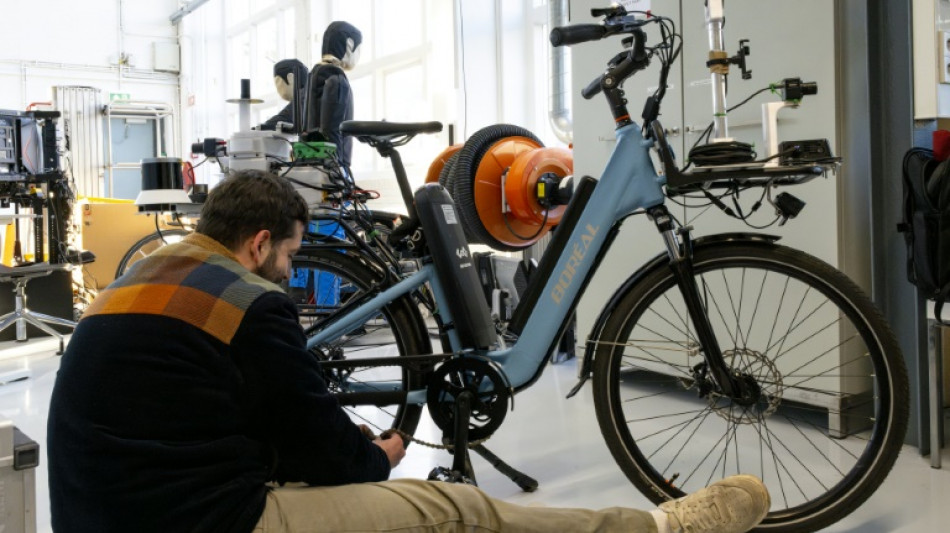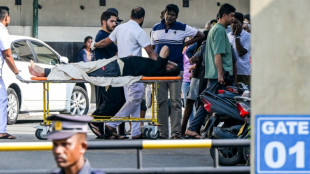
-
 Pete Hegseth: Trump's Iran war attack dog
Pete Hegseth: Trump's Iran war attack dog
-
Celtics' Tatum could make injury return on Friday

-
 'Enemy at home': Iranian authorities tighten grip as war rages
'Enemy at home': Iranian authorities tighten grip as war rages
-
Bethell set for 'hell of a career', says England captain Brook

-
 France coach Galthie slams Scotland for 'smallest changing room in the world'
France coach Galthie slams Scotland for 'smallest changing room in the world'
-
Medvedev arrives in Indian Wells after being stranded in Dubai

-
 Trump fires homeland security chief Kristi Noem
Trump fires homeland security chief Kristi Noem
-
Mideast war risks pulling more in as conflict boils over

-
 Wales' James Botham 'sledged' by grandfather Ian Botham after Six Nations error
Wales' James Botham 'sledged' by grandfather Ian Botham after Six Nations error
-
India hero Samson eyes 'one more' big knock in T20 World Cup final

-
 Britney Spears detained on suspicion of driving while intoxicated
Britney Spears detained on suspicion of driving while intoxicated
-
Grooming makes Crufts debut as UK dog show widens offer

-
 Townsend insists Scots' focus solely on France not Six Nations title race
Townsend insists Scots' focus solely on France not Six Nations title race
-
UK sends more fighter jets to Gulf: PM

-
 EU to ban plant-based 'bacon' but veggie 'burgers' survive chop
EU to ban plant-based 'bacon' but veggie 'burgers' survive chop
-
Leagues Cup to hold matches in Mexico for first time

-
 India reach T20 World Cup final after England fail in epic chase
India reach T20 World Cup final after England fail in epic chase
-
Conservative Anglicans press opposition to Church's first woman leader

-
 Sri Lanka takes control of Iranian ship fearing new US sub attack
Sri Lanka takes control of Iranian ship fearing new US sub attack
-
Iran players sing anthem and salute at Women's Asian Cup

-
 India beat England in high-scoring T20 World Cup semi-final
India beat England in high-scoring T20 World Cup semi-final
-
Mideast war traps 20,000 seafarers, 15,000 cruise passengers in Gulf

-
 Italy bring back Brex to face England
Italy bring back Brex to face England
-
French policeman to be tried over 2023 killing of teen

-
 More flights take off despite continued fighting in Middle East
More flights take off despite continued fighting in Middle East
-
Ukraine, Russia free 200 POWs each

-
 Middle East war halts work at WHO's Dubai emergency hub
Middle East war halts work at WHO's Dubai emergency hub
-
Paramount's Ellison vows CNN editorial independence

-
 US says attacks on alleged drug boats have spooked traffickers
US says attacks on alleged drug boats have spooked traffickers
-
Dempsey returns as Scotland shuffle pack for Six Nations clash against France

-
 India pile up 253-7 against England in T20 World Cup semi-final
India pile up 253-7 against England in T20 World Cup semi-final
-
Wary Europeans pledge 'defensive' military aid in Mideast war

-
 Oil prices rise, stocks drop as Middle East war stirs supply concerns
Oil prices rise, stocks drop as Middle East war stirs supply concerns
-
Seven countries to boycott Paralympics ceremony over Russia: organisers

-
 UK's Crufts dog show opens with growing global appeal
UK's Crufts dog show opens with growing global appeal
-
PSG prepare for Chelsea clash with Monaco rematch

-
 Google opens AI centre as Berlin defends US tech reliance
Google opens AI centre as Berlin defends US tech reliance
-
Second Iranian ship nears Sri Lanka after submarine attack

-
 Portugal mourns acclaimed writer Antonio Lobo Antunes
Portugal mourns acclaimed writer Antonio Lobo Antunes
-
Union loses fight against Tesla at German factory

-
 Wales revel in being the underdogs, says skipper Lake
Wales revel in being the underdogs, says skipper Lake
-
German school students rally against army recruitment drive

-
 Wary European states pledge military aid for Cyprus, Gulf
Wary European states pledge military aid for Cyprus, Gulf
-
Liverpool injuries frustrating Slot in tough season

-
 Real Madrid will 'keep fighting' in title race, vows Arbeloa
Real Madrid will 'keep fighting' in title race, vows Arbeloa
-
Australia join South Korea in quarters of Women's Asian Cup

-
 Stocks, oil climb as Middle East war stirs volatility
Stocks, oil climb as Middle East war stirs volatility
-
Kane to miss Bayern game against Gladbach with calf knock

-
 Henman says Raducanu needs more physicality to rise up rankings
Henman says Raducanu needs more physicality to rise up rankings
-
France recall fit-again Jalibert to face Scotland


Dutch researchers employ unique e-bike to make cycling safer
Dutch university researcher Holger Caesar heads out into the afternoon traffic on a bicycle like no other, equipped to collect data he believes may one day save lives.
His blue electric bike, kitted out with an array of laser sensors and scanners, speeds off among thousands of students pedalling home through the campus of the Delft University of Technology.
The campus of TU Delft is a warren of cycle paths -- a perfect encapsulation of life in a country where bicycles outnumber people.
As Caesar cycles through Delft's busy streets, his bicycle sweeps up data on range, direction and elevation of both moving and stationary objects -- including cyclists, pedestrains and cars.
The aim is to build a three-dimensional picture of its surroundings and a better undestanding of the way road users behave.
"We hope these datasets will have lots of applications in future," he said, suggesting they could help cyclists avoid obstacles, build self-stabilising bicycles or teach autonomous vehicles how to avoid hitting two-wheeled travellers.
"For cars it's relatively simple... They go left. They go right. They go straight on. But it's very hard to predict how cyclists are going to behave," Caesar told AFP.
"You could, for instance, use the data to develop an application that alerts car drivers when a cyclist makes an unexpected move."
- Laser sensors -
The "Delft SenseBike" itself would be at home in a science fiction film, equipped as it is with LiDAR sensors at the front and back.
LiDAR -- "Light Detection And Ranging" technology -- is commonly used in autonomous vehicles, which use the laser detection to create a three-dimensional image of their surroundings.
The infrared light rays emitted by the sensors bounce off surfaces and relay back information to "map" the area through which the SenseBike travels, including detecting moving objects like cyclists.
The data is processed using a labelling technique that associates everything visible in the images to a description of what it is -– such as "tree", "cyclist" and "traffic light".
This technique should allow a car driver to recognise a "cyclist" when they see one and avoid a collision.
"The first step will be to make this data publicly available, so that academics and entrepreneurs can benefit from it," said Caesar.
Then artificial intelligence algorithms can be developed to detect, track and predict cyclists' behaviour so drivers can "plan a route around them", he said.
- 'Lack of data' -
At the moment there is a dearth of data on bikes and cycling in the Netherlands, despite their popularity.
For example, there are few statistics on bicycle accidents in a country that boasts around 37,000 kilometres (23,000 miles) of cycle paths and 22 million bikes.
"It's a difficult question to answer," the Dutch Cyclists' Federation says on its website, noting that "not all accidents are registered".
The Dutch Central Statistics Bureau registered around 270 people as dying in bicycle accidents in 2023.
Almost half the deaths were caused by collisions between cyclists and cars, lorries or buses.
"Cars are becoming safer for their passengers but not for other road users," said the cycling federation's director Esther van Garderen.
Asked whether the Delft University data could one day be used to develop an autonomous "self-riding" bicycle, Caesar laughed and shook his head.
"I think that would kind of take away the fun of cycling," he grinned.
"We probably don't want to do that, but we still think we can make cycling safer."
B.Finley--AMWN


